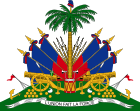
Back Πολιτική της Αϊτής Greek Politiko de Haitio Esperanto Politique en Haïti French פוליטיקה של האיטי HE Politik nan Ayiti HT Haitisk politikk NN Política do Haiti Portuguese Государственный строй Гаити Russian 海地政治 Chinese
 |
|---|
|
|
The politics of Haiti takes place in the framework of a unitary semi-presidential republic, where the president is the head of state and the prime minister is the head of government. The politics of Haiti are considered historically unstable due to various coups d'état, regime changes, military juntas and internal conflicts. After Jean-Bertrand Aristide was deposed, Haitian politics became relatively stable. The Economist Intelligence Unit rated Haiti an "authoritarian regime" in 2022.[1] According to the V-Dem Democracy indices Haiti is 2023 the 4th least electoral democratic country in Latin America.[2]
Political corruption is widespread in Haiti and it has consistently ranked as one of the most corrupt nations according to the Corruption Perceptions Index, a measure of perceived political corruption. In 2006, Haiti was ranked as the most corrupt nation out of the 163 that were surveyed for the index.[3] In 2020, Haiti was #170 out of 180.[4] The International Red Cross reported that Haiti was 155th out of 159 countries in a similar survey of corrupt countries.[5] In 2013, Haiti ranked #8 in the Fragile States Index.[6]
- ^ "Democracy Index 2022: Frontline democracy and the battle for Ukraine" (PDF). Economist Intelligence Unit. 2023. Retrieved 2023-02-09.
- ^ V-Dem Institute (2023). "The V-Dem Dataset". Retrieved 14 October 2023.
- ^ "2006 Corruption Perceptions Index reinforces link between poverty and corruption". Transparency International. 2006-11-06. Archived from the original on 2009-06-25. Retrieved 2006-11-06.
- ^ Transparency International. "Corruptions Perception Index". 2012. Retrieved 2 December 2013.
- ^ "Hoping for change in Haiti's Cité-Soleil". International Red Cross. Retrieved 2007-08-16.
- ^ Fund for Peace. "Failed States Index 2013". Archived from the original on 6 February 2015. Retrieved 2 December 2013.
© MMXXIII Rich X Search. We shall prevail. All rights reserved. Rich X Search